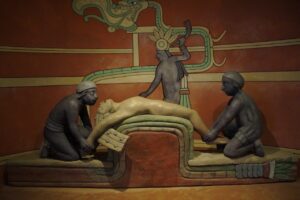Audio accessibility for this blog post is powered by Microsoft Text-to-Speech technology. These recordings are provided for personal, non-commercial educational use only.
 A Roman Stoic philosopher named Dio Chrysostom (40-115 AD) explicitly condemned slavery in his 15th discourse “On Slavery and Freedom II (See 15:24-28).
A Roman Stoic philosopher named Dio Chrysostom (40-115 AD) explicitly condemned slavery in his 15th discourse “On Slavery and Freedom II (See 15:24-28).
It was in the context of a dialogue between two characters (real or imagined) where they were debating whether one of them was a slave. It turned into a debate over what slavery was, and the crowd settled on the theory that a man becomes a slave if he is taken possession of in the way goods and cattle are. The Slave objected that you can gain possession of something invalidly and argued that gaining possession of someone conquest through battle is invalid-and that all forms of slavery depend on this and therefore in turn are invalid. The crowd argued that you can perhaps become a slave after 2-3 generations. The slave responded as follows:
“27 ‘But how can that be? For if being captured makes a man a slave, the men who themselves were captured deserve that appellation more than their descendants do; and if it is having been born of slaves that makes men so, it is clear that by virtue of being sprung from those who were taken captive and were consequently free-born, their descendants would not be slaves. For instance, we see that those famous Messenians after the lapse of so many years recovered not only their freedom but their territory as well.
28 For when the Spartans were defeated at Leuctra by the Thebans, the latter marched into the Peloponnese supported by their allies, and not only compelled the Spartans to give back the Messenian territory, but settled in Messene again all the original Messenians’ descendants, the Helots as they were called, who had previously been in servitude to the Spartans. And not a man says that the Thebans therein acted unjustly, but all agree that altogether nobly and justly. Consequently, if this method of gaining possession, from which all the others take their beginning, is not just, it is likely that no other one is either, and that the term ‘slave’ does not in reality correspond to the truth.”
There was no rebuttal given to him and the dialogue ends shortly after
So yeah, the Roman philosopher Dio Chrysostom used a dialogue to quite effectively argue that all slavery is unjust. He definitely should get a statue in his honor.
Why didn’t the Bible condemn slavery if an uninspired Pagan writer at the time did? You can also add the case of Seneca who in his letter “Of Slaves and Masters”, denounced the abuse of slaves and while similar to the Apostle Paul’s writing on slavery, it went further and said that masters should not use corporal punishment on slaves. (Seneca wasn’t anti-slavery just pro-treating them less harshly). The historical context argument Christians make about the Bible and slavery is plain wrong since several Pagan intellectuals went further than the Bible even at the time.
I am specifically talking about the chattel slavery in Leviticus 25:44-46 (Chattel Slavery = slaves are inheritable property with few to no rights). Leviticus 25:44-46 endorsed a system of chattel slavery for non-Hebrew slaves that were bought. I am not denying that they had some rights such as the right to not be killed or excessively beaten.
The Antebellum South banned murdering slaves as well. For example, John Hoover was convicted and executed for murdering one of his slaves. (The penalties and details of the laws varied based on time and place). In the case of Louisiana, they had Code Noir, which banned excessively beating slaves for no reason as well. (Although the penalty for murder was lower than some states). Of course, these laws were hardly enforced since slaves couldn’t testify against white people. However, the basic point that slavery in the Antebellum South and slavery for non-Hebrew slaves in the Bible were the same kind of system remains even though it was doubtlessly better to be a slave in the Bible than in the Antebellum South.
As for the common argument that the Bible regulated slavery, so did the Code of Hammurabi (117-119 and 170-171). As a matter of fact, the code of Hammurabi had the maximum time someone could be in debt slavery set at three years (Code of Hammurabi 117) while the Bible had the maximum for debt slavery set at 6 years (Duetronomy 15:12-17). This was a case of a Biblical regulation of slavery being out right regressive which calls into question the idea that the Bible’s goal was to make slavery more humane.
Another point is that even pro-slavery writers in the Antebellum South frequently condemned the abuse of slaves:
William Harper (1790-1847).
“I am sure that it is unnecessary to say to an assembly like this that the conduct of the master to his slave should be distinguished by the utmost humanity. That we should indeed regard them as wards and dependents on our kindness, for whose wellbeing in every way we are deeply responsible. This is no less the dictate of wisdom, then of right feeling… It is wise, too, in relation to the civilized world around us, to avoid giving occasion to the odium which is so industriously excited against ourselves and our institutions. For this reason, public opinion should, if possible, bear even more strongly then it does at present, on masters who practice any wanton cruelty on their slaves. The miscreant who was guilty of this, not only violates the law of God and of humanity, but as far as in him lies, by bringing odium upon, endangers the institutions of his country and the safety of his countrymen.”
-William Harper, Harper’s Memoir On Slavery Pg. 64-65.
George Fitzhugh (1806-1881).
“We might and should have laws in Virginia, as in Lousiana, to make the master subject to presentment by grand jury and to punishment, for any inhumane or improper treatment, or neglect of his slave.”
“We abhor the doctrine of the ‘Types of Mankind;’ first because it is at war with scripture, which teaches us that the whole human race is descended from a common parentage; and, secondly, because it encourages and incites brutal masters to treat negroes, not as weak, ignorant and dependent brethren, but as wicked beasts, without the pale of humanity.”
-George Fitzhugh, Sociology for the South: Or, The Failure of Free Society Pg. 95.
Samuel Seabury (1801-1872).
“So with the relation of master and slave: the law of Nature gives the master the authority to govern his slave, but not to abuse him: it limits the excercise of his authority by a just regard to the end for which it is conferred; that is to render the slave obedient to his just demands and to obtain from him that service which is the master’s due. All beyond this usurpation and cruelty-abhorrent to the law of nature.”
-Samuel Seabury, American Slavery Distinguished from the Slavery of The English Theorists and Justified By the Law of Nature, Pg. 184.
If people who defended the horrific system of slavery in the Antebellum South denounced excessive cruelty towards slaves, the Bible condemning such cruelty is no evidence that it isn’t pro-slavery. Allowing slavery (and not denouncing it) in a time where it was near-universally accepted is prima facie evidence that you support it.
– Anonymous
 First, let me say something by way of introduction for other readers of this blog.
First, let me say something by way of introduction for other readers of this blog.
The Bible Knowledge Commentary edited by John F Walvoord and Roy B Zuck puts it follows
“Though slavery was permitted under the Mosaic Law with certain restrictions, even Gentile slaves were given some protection, such as rest on the Sabbath (Ex. 20:10; Deut. 5:14) and prohibition of mistreatment (Ex. 21:20–21; Deut. 23:15–16). As God’s servants the Israelites were not to be enslaved to any other master (Lev. 25:55). Yet a poor Hebrew might have to enter a type of temporary slavery, a situation more humane than 19th-century debtors’ prisons. Hebrew slaves had broader rights than Gentile slaves and so a Hebrew’s master’s power over him was more restricted (vv. 39–43). This was in keeping with the slave’s status as a servant of the Lord.
25:39–43. A Hebrew slave was to be treated as a hired worker rather than as a slave (cf. v. 43). Both he and his children who were born in the master’s household were to be released in the Year of Jubilee. They were not to be sold as slaves to others. According to Exodus 21:1–11 and Deuteronomy 15:12–18, a Hebrew slave could be released after six years of service, but it is not clear how this correlated with the release of the Jubilee.
25:44–46. Gentile slaves were exempt from these restrictions, so they were slaves for life and could be willed as inherited property.
25:47–55. Whether purchased by a fellow Israelite (vv. 39–43) or a resident alien (vv. 47–53), a Hebrew slave could be redeemed by laws similar to the redemption of property (cf. vv. 23–28). Ideally, a relative would free him by paying off the debt which forced him into slavery (vv. 48–49). Or if he prospered he could redeem himself. If neither of these measures was possible, he would be released in the Year of Jubilee.” (bold in original) 1
Question 1: Why didn’t The Bible outlaw Slavery if we can find other ancient authors who opposed it?
As Graham Veale and David Glass write;
“The slavery described by the Old Testament texts was different in purpose, function and practice than the slavery of the British Empire or the American colonies. Ancient Israel was an agricultural community in which every family was one bad harvest away from starvation. Money was rarely exchanged; there was no welfare system. The slavery described by the Old Testament law existed so that workers could provide for their families in lean times. If a crop failed a father could go to work for a land owner in exchange for a loan. Or he might send his wife or children to work in another’s’ fields for food and board.
In other words, the immediate abolition of slavery would have led to widespread starvation.” 2
Question 2: Other Ancient Authors Regulated Slavery To Prevent Abuse Of Slaves. And Some Spoke Out Against It Entirely. How Do I Know The Bible Isn’t Pro-Slavery?
So, one of the main points was you were advocating avoiding is the error of assuming that just because the Bible wasn’t advocating for the right of slave owners to do whatever they want with their slaves, that the Bible isn’t pro-slavery. Hence the quotes by slavery apologists saying that they opposed abuse and supported “humane” treatment. Seneca’s Letter “Of Slaves and Masters” provides evidence that this attitude existed in the time of the New Testament. What if God is like these other authors? What if he’s pro-slavery but is against their abuse and mistreatment?
I think the picture becomes clear if we look at the situation in terms of God’s overall plan of history. In the beginning when the first two humans were created in the garden, man and woman were equal. Genesis 1:26-27 says; “Then God said, ‘Let us make mankind in our image, in our likeness, so that they may rule over the fish in the sea and the birds in the sky, over the livestock and all the wild animals, and over all the creatures that move along the ground.’ So God created mankind in his own image, in the image of God he created them; male and female he created them.” So, we see that all of mankind is created in God’s image. As I point out in the first essay of my primeval history series, to be made in God’s image is to be a representative of God in His cosmic temple. The author of Genesis employed the imago dei as an analogy and a polemic to other gods. Gods with a lowercase g have non-living images. But the “Living God” (Psalm 84:2) has living images. Hence, he’s superior. It wouldn’t make much sense in a temple for one image of that temple’s god to be inferior to another image. If you have two statues of Dagon in his temple, the two images are equal. One is not inferior to the other. In Yahweh’s temple (His cosmic temple – the universe) His images are likewise equal. In Genesis 1:26-27, humans are superior to all other animals and are to rule over them. There is no hint in humanity’s beginning that slavery was ever something God had wanted or planned. Someone might point to Genesis 3:16 and argue that this is an example of God instituting slavery, however, (1) it’s clearly ONLY males ruling over females and (2) along with the vast majority of other things in Genesis 3, this appears to be descrptive rather than prescriptive. Or perhaps predicitve.That is to say; God is telling Eve that women desiring their husbands but their husbands ruling over them will be one of the outcomes of living in a world governed by sin.
“Were you a slave when you were called? Don’t let it trouble you—although if you can gain your freedom, do so.” – 1 Corinthians 7:21 (NIV)
The ESV renders it with the better translation “Were you a bondservant when called? Do not be concerned about it. (But if you can gain your freedom, avail yourself of the opportunity.)”
The CSB Study Bible says
“3:28 The equality and unity spoken of here is of a spiritual nature—in Christ. Paul had just discussed at length that the Jew has no spiritual advantage over the Greek (Gentile), and now he says the same equality is true for social and gender distinctions. No people group or gender is to be exalted above others.”4
In Christ’s kingdom, there is no one superior to another. The Kingdom of God abolishes all class distinctions.
Another reason to think God sees slavery as a bad thing (or at least not ideal) is all the times Jesus (i.e God incarnate) and Paul (who wrote under the Spirit’s inspiration) used slavery and freedom as analogies for sin and salvation.
“Jesus replied, Very truly I tell you, everyone who sins is a slave to sin. Now a slave has no permanent place in the family, but a son belongs to it forever. So if the Son sets you free, you will be free indeed.” – John 8:34-36
“What shall we say, then? Shall we go on sinning so that grace may increase? By no means! We are those who have died to sin; how can we live in it any longer? Or don’t you know that all of us who were baptized into Christ Jesus were baptized into his death? We were therefore buried with him through baptism into death in order that, just as Christ was raised from the dead through the glory of the Father, we too may live a new life.
For if we have been united with him in a death like his, we will certainly also be united with him in a resurrection like his. For we know that our old self was crucified with him so that the body ruled by sin might be done away with,that we should no longer be slaves to sin— because anyone who has died has been set free from sin.
Now if we died with Christ, we believe that we will also live with him. For we know that since Christ was raised from the dead, he cannot die again; death no longer has mastery over him. The death he died, he died to sin once for all; but the life he lives, he lives to God.
In the same way, count yourselves dead to sin but alive to God in Christ Jesus. Therefore do not let sin reign in your mortal body so that you obey its evil desires. Do not offer any part of yourself to sin as an instrument of wickedness, but rather offer yourselves to God as those who have been brought from death to life; and offer every part of yourself to him as an instrument of righteousness. For sin shall no longer be your master, because you are not under the law, but under grace.” – Romans 6:1-15
Paul continues using the analogy of slaves and freed men in verses 16-18. It’s pretty obvious from these examples (and more could be cited) that God sees being a slave as a bad thing. It’s not what He desires. If God saw slavery as a good thing, why would The Son as an incarnate human and The Holy Spirit didacate using slavery as an analogy to the horrible human condition of being corrupted and ruled by our sinful nature, which God reverses through the shed blood and regenerating work of The Son and The Spirit respectively? The analogy would make no sense unless God saw being slaves as a bad thing. If it were a legitimate human condition, the analogy would fail.
So, my conclusion is that God (and the biblical authors he inspired by extention) were not pro-slavery. However, given the period of time in which Israel entered the promised land, God saw fit to permit the system for a time and just heavily regulate it to prevent as much evil and suffering as possible. Ultimately history under His providence was moving towards a time when no one would be a slave (to humans or to sin).
In Christ, we are all equal (Galatians 3:28), as humans we are all equal (Genesis 1:26-27), and in the eschaton, we will rule over angels (see 1 Corithians 6:3). Everyone in Christ is a child of Yahweh (John 1:12, Galatians 4:6) and therefore, we are all sons and daughters of the king. Now, a king does not treat His children unequally. A king doesn’t let one of his princes have ownership of another.
The eschaton is vividly described in Revelation 21-22, which is obviously the ideal situation for the whole world. It’s after the return of Christ, after the resurrection, with Revelation 21:4 mentioning all kinds of bad stuff that John says is no more. There isn’t a single menton of anyone being slaves. And why would there be? Again, we are all one in Christ Jesus. We are all sons and daughters of the most high. If we’re servants to anyone, it is to the Godhead alone (Romans 1:1, Collosians 4:1). But this slavery is, paradoxically, a freedom. Indeed, to be a slave to Christ is to be more free than anyone will ever be. We are freed from the power of sin (as well as the consequences of sin), we are freed from the power of death, we are freed from any physical infirmeries that plagued us in this life. I suppose I should stop here before this article becomes a sermon. All I’ll say further is that it was these principles which ultimately lead to the abolishment of slavery in America.
Question 3: What About The 10th Commandment?
In a follow up message to this, you said “You add the tenth commandment prohibiting the coveting of slaves and the impression of sanctioning slavery as legitimate and protected by Divine law is utterly overwhelming. You can see why people thought the Bible condoned slavery in the past. (The slavery apologist James Henry Hammond explicitly cited the tenth commandment prohibiting the coveting of slaves as sanctioning the right to property in slaves in ‘Hammond’s Letters On Slavery.’).”
First, let’s look at the Tenth Commandment.
“You shall not covet your neighbour’s house, you shall not covet your neighbour’s wife, nor his manservant, nor his maidservant, nor his ox, nor his ass, nor any thing that is your neighbour’s.” – Exodus 20:17
I won’t deny that the tenth commandment certainly seems to imply that servants are the property of their masters at face value, and are therefore inferior. However, in light of all the biblical data just surveyed, this doesn’t seem like a valid interpretation. How then, might we undertstand the tenth commandment? Well, even today in English we use posessive language of things that “belong” to us. We use terms such as “MY wife” or “MY children”. Or “MY Employees”. We don’t mean we literally own these people, but that these people belong to us by way of a certain relationship. I am related to my parents as offspring, therefore I am “their” son. They don’t own me though. Yet we use the same posession of our family members (MY aunt) as we do inanimate objects that literally are our property (MY computer, MY house, MY car).
While one certainly can interpret this commandment as implying that servants are mere property, it can also be interpreted as just using posessive language of an employer to an employee. Given the context of The Bible’s teaching as a whole (prevously laid out), I argue that the latter is the case.
Conclusion
God is good, and His laws and commandments are good. The Old Testament can sometimes be “messy” as Peter Enns often likes to say. Nevertheless, I think it’s a mess that can be cleaned up through the hard work of exegesis and study. The Old Testament world was very different from our own and sometimes some of the things we read can come off as bizarre or even offensive to our modern sensibilities.
To readers of this blog, I cannot recommend enough the book “Is God A Moral Monster?: Making Sense Of The Old Testament God” by Paul Copan.
Also, it is my hope that this correspondance has helped to advance the conversation on the uncomfortable topic of slavery in The Bible.
——————————-
NOTES
1: F. Duane Lindsey, “Leviticus,” in The Bible Knowledge Commentary: An Exposition of the Scriptures, ed. J. F. Walvoord and R. B. Zuck, vol. 1 (Wheaton, IL: Victor Books, 1985), 211.
2: Does the Bible Endorse Slavery? Answering Sam Harris (Part One)
Posted on 2018/07/14 by Saints and Sceptics —http://www.saintsandsceptics.org/10-things-you-need-to-know-about-the-bible-and-slavery/
3: Craig S. Keener and John H. Walton, eds., NIV Cultural Backgrounds Study Bible: Bringing to Life the Ancient World of Scripture (Grand Rapids, MI: Zondervan, 2016), 2049.
4: A. Boyd Luter, “Galatians,” in CSB Study Bible: Notes, ed. Edwin A. Blum and Trevin Wax (Nashville, TN: Holman Bible Publishers, 2017), 1862.4

If you have any questions about Christian theology or apologetics, send Mr. Minton an E-mail at CerebralFaith@Gmail.com. It doesn’t matter whether you’re a Christian or Non-Christian, whether your question is about doubts you’re having or about something you read in The Bible that confused you. Send your question in, whatever it may be, and Mr. Minton will respond in a blog post just like this one.
Share this:
- Share on Facebook (Opens in new window) Facebook
- Share on X (Opens in new window) X
- Print (Opens in new window) Print
- Email a link to a friend (Opens in new window) Email
- Share on Pinterest (Opens in new window) Pinterest
- Share on Reddit (Opens in new window) Reddit
- Share on LinkedIn (Opens in new window) LinkedIn
- Share on Tumblr (Opens in new window) Tumblr
Discover more from Cerebral Faith
Subscribe to get the latest posts sent to your email.




